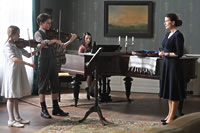“In those days you needed talent”

In 1941 in Poltava, Ukraine, 3 young and gifted violin players swear a lifelong allegiance to each other’s friendship and to music. One of them is a German girl living in Ukraine, the other two are Jewish. As prodigies their future seems bright and shiny, until war closes in and things take a dramatic turn. Their musical talents can secure them for a while, until they face the final challenge: playing the perfect virtuoso concerto. “Perfection separates the strong from the weak,” the Nazi officer says.
WUNDERKINDER confronts you with the overpowering absurdity of war. In a remarkable scene refugees gather around a dying deer found on the woodland. One of them stammers: “So this is war?” There the movie touches the heart of war’s tragic surrealism.
 Alice Brauner has a problem understanding the world. “WUNDERKINDER is not in the pre-selections for the LOLA – German National Film Award. The film wins 3 awards (including the ECFA Award) in Giffoni, there were standing ovations in Palm Springs and an award in Jerusalem. But in Germany it’s not worth being mentioned. Maybe it’s a generational thing: adults consider it as children’s movie while a children’s jury might rather choose typical children’s movies like the CROCODILES or WICKIE for the age up until 12. Or maybe it’s a cultural conflict: the German press kept on nagging about silly historical details in uniforms and armor, forgetting what the movie is really about. History is repeating itself: in 1989 CCC’s EUROPA EUROPA (by Agnieszka Holland) won a Golden Globe but still wasn’t submitted by the German Committee for the Academy Awards.”
Alice Brauner has a problem understanding the world. “WUNDERKINDER is not in the pre-selections for the LOLA – German National Film Award. The film wins 3 awards (including the ECFA Award) in Giffoni, there were standing ovations in Palm Springs and an award in Jerusalem. But in Germany it’s not worth being mentioned. Maybe it’s a generational thing: adults consider it as children’s movie while a children’s jury might rather choose typical children’s movies like the CROCODILES or WICKIE for the age up until 12. Or maybe it’s a cultural conflict: the German press kept on nagging about silly historical details in uniforms and armor, forgetting what the movie is really about. History is repeating itself: in 1989 CCC’s EUROPA EUROPA (by Agnieszka Holland) won a Golden Globe but still wasn’t submitted by the German Committee for the Academy Awards.”
By that time your father Artur Brauner was running CCC Filmkunst.
Alice Brauner: “My father is a legend. He founded CCC Films 65 years ago. For the Berlinale he will receive the Honorary Membership of the German Producers Guild. He has won two Golden Globes, Gold and Silver Bears and all other prestigious awards. In Jerusalem at Yad Vashem, the world center for Holocaust Research, he has a rememberance space named after him where you have access to all his films. I feel blessed to keep his heritage alive.”
Does this background in cinema history feels more like a blessing than a curse?
Brauner: “Surely. I had my own career, being a journalist and a TV-host. 6 years ago he asked me into the company as he wanted someone to continue his work. ‘Help me not to let it all vanish.’ I felt ready for it. I was born in movies, as a child I met all the actors my father brought home like Romy Schneider, Kirk Douglas, Lex Barker, etc. I was reading scripts all my life and I became a journalist because I’m so curious. My father is a self-made man and we all know how they can run offices like dictators. In his perspective there are two opinions: his one and the wrong one. I didn’t want to be a marionette, standing in his shadow.”
But you took up the challenge.
Brauner: “Even now at the age of 93 his storytelling and dramaturgy is excellent, but the movies he produced in the 90’s up ‘til 2000 look as if they were shot 40 years ago. Nearly 6 years ago we started our first project together. And only about WUNDERKINDER we had our first big argument. Being a holocaust survivor, he wanted to have plenty of violence in the movie. I didn’t see it that way. I didn’t want concentration camps, I didn’t want exploitation of violence. I wanted psychological pressure and terror. In his career my dad made 21 films dedicated to the war remembrance, but the 22nd one I wanted to dedicate to the children of the holocaust. And I didn’t want any physical cruelty or brutal shooting drenched in blood in it.”
The background of the story is rather complex: a German family in Ukraine where Jews live under a Nazi occupation… How to make this clear to an audience of young people who might not be familiar with the situation?
Brauner: “We made a study guide for teachers and pupils as we want children to be prepared before seeing the movie. And we want them to discuss it afterwards. Most of them still know about the holocaust, but they don’t know for instance about the Hitler-Stalin pact, which made many Germans accept jobs in Ukraine.”
Is some of your family history included in WUNDERKINDER?
Brauner: “My father has difficulties sleeping. At night he muses how to puzzle all those little pieces of his life into our movies. Being his children, we don’t know the whole story. But I know he was hiding for some time in Russia, and there he got help from non-Jewish people. This film is a way of saying thank you to some good, anonymous people from a long gone past.”
Now you want young people still to be aware of the horrors of war?
Brauner: “WUNDERKINDER in the first place is a pledge for tolerance and civil courage. Differences in nationality, religion or culture shouldn’t be a barrier for young people to come together. In WUNDERKINDER Jewish children help Germans and vice versa and they can’t understand why adults don’t think the same way. It’s not a holocaust movie. This story could take place in India and Pakistan, with Jews and Palestinians in Israel or Sunni’s and Shiites in Iraq. Young people can proof their civil courage in every conflict that grew out of the madness and insanity of adults. How many geniuses, how many great composers, great artists or simply great people have we missed by killing so many young people in that war?”
Like young Elin Kolev, who plays the role of Abrascha.
Brauner: “Elin is 15 and is one of the world’s best violin players of his age. He played every note in the film himself. He and the two girls were chosen in a casting with 400 candidates and he is a real genius. During the Berlinale he’ll play a concert in the Berliner Philharmonie. After a day on the set – and those days can be long! – he still practiced for several hours on his violin.”
In the last scenes you bring his character back to life as an old man. That must have been difficult.
Brauner: “We couldn’t make the audience leaving the theatre with nothing but deaths on their mind. It is important to assure them not everybody died. Although nobody ever survived the concentration camps because he played the violin so well. Often in discussions young audiences told us they were grateful that some of the children survived. They understood the story and were sad, but the film didn’t make them lose their belief that friendship makes sense and can make things better.”
The film is about 3 child prodigies. Can their situation somehow be compared with the young stars of today?
Brauner: “In those days you needed to have real talent! Today everybody can be a star. Elin is not a star but he is good in what he does because he works so hard. Bringing him to the Giffoni festival must have been the closest he could get to stardom: he was the hero of all the festival’s young ladies, signing autographs all the time.”
The film’s locations are remarkable, with the early forties Ukraine coming back to live, the classic architecture of villa’s and concert halls and the fantastic brewery.
Brauner: “All forest scenes were shot in North-Rhine Westphalia since they have maybe the best film financing support in Germany. For the village scenes we checked the original city of Poltava but nothing still looked like in the old days. There was no way we could shoot there. Then we found the city of Putbus on the Rügen Island in North-East Germany. It looked exactly like what we wanted. We didn’t have to make many efforts in preparing the location. The brewery we found in Berlin, but a lot of work was required to transform it the way we wanted it.”
Is there a tradition of producing children’s films in CCC’s 65 year old film catalogue?
Brauner: “Unfortunately there isn’t. In the sixties we produced some of the WINNETOU films and some westerns that were tremendously popular amongst youngsters. But there hasn’t been much of that until WUNDERKINDER came around.”
Is it so hard to produce children’s films in Germany?
Brauner: “Even to produce films in general. Our job as not concern-bound, independent producers gets more difficult every day. Everything is in the hands of big companies, closely connected to public broadcasting channels (ARD and ZDF) or private channels. With for instance big corporate groups like Constantin Film or UFA or the daughter-companies of TV-channels like Bavaria as competitors, we have to fight hard for our projects. That’s why my father wanted to make WUNDERKINDER for a minimum cost. But I couldn’t accept a low-budget film. Luckily I found ARD Degeto willing to participate for 50 % of the budget. Since less people are going to the movies, we depend on those TV-assignments. We need them!”
Gert Hermans
